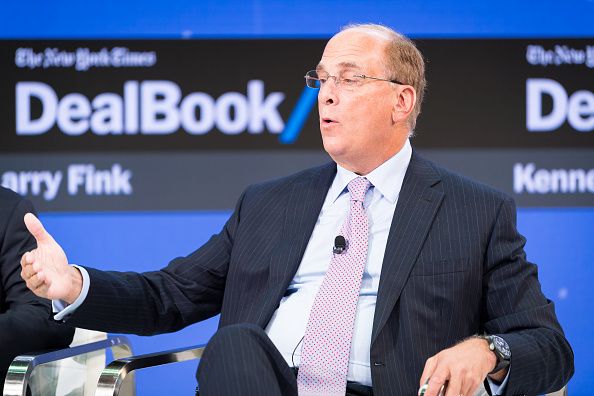

Companies that are looking to receive support from investment giant BlackRock are going to have to put a priority on social responsibility, board diversity and long-term strategy moving forward—a move that highlights the importance of how successful businesses are giving back to society.
In a letter to CEOs this week, BlackRock chairman and CEO Larry Fink wrote that financial success is only one piece of the puzzle for prosperous companies, and that businesses must make a positive contribution to society while benefiting shareholders, employees, customers and their communities.
“Society is demanding that companies, both public and private, serve a social purpose. To prosper over time, every company must not only deliver financial performance, but also show how it makes a positive contribution to society,” Fink said. “Companies must benefit all of their stakeholders, including shareholders, employees, customers and the communities in which they operate.”
“ I wouldn’t ignore what’s being said about ESG and diversity. I think that institutional investors are willing to back that up, when their investments allow.” – TK KERSTETTER
The statement from such a big player in the investment space shows that these matters will play an important role in how companies operate moving forward.
“We’ve seen [environmental, social and governance issues] start to be emphasized by more than just BlackRock, and that’s why boards need to pay attention,” TK Kerstetter, CEO of Board Resources LLC, and editor at large for Chief Executive’s sister publication Corporate Board Member says. “While there might be the thought that [boards] don’t need to focus on everything being thrown their way by institutional investors today, I wouldn’t ignore what’s being said about ESG and diversity. I think that institutional investors are willing to back that up, when their investments allow.”
Yale School of Management senior associate dean for leadership studies Jeffrey Sonnenfeld says the statement is a bold move that should be applauded.
“Larry Fink and BlackRock are to be congratulated on this call to recognize a wide slice of constituents which includes but is not limited to immediate investor returns,” Sonnenfeld told Chief Executive. “Only some state pension funds such as Calpers or targeted social responsibility funds such as Calvert or Domini have had such investment criteria. No large institutional investor has applied such criteria across their portfolios despite such sensitivity at Vanguard and TIAA over the years.”
Sonnenfeld cited PepsiCo’s successful “Performance with Purpose” sustainability initiative launched by CEO Indra Nooyi in 2006 as an example of a company handling corporate social responsibility the right way.
“[Nooyi] believes that doing good is not antithetical to doing well,” Sonnenfeld says. “Thus with unsurpassed investor returns in the food business, PepsiCo has exceeded its published soaring goals for 2025 to cut sugar, salt and saturated fats in most of its foods while reducing water use and waste production and promoting safe work conditions and global human rights.”
There is a bit of a challenge for CEOs and boards when it comes to articulating their long-term strategy, as they need to be clear and detailed enough to satisfy investors without tipping their hand to competitors.
“It’s a fine line, but BlackRock is making it clear that it’s something board members had better be able to talk about, because if not, it goes into the column that this board isn’t staying on top of strategy at the level that this investor wants,” Kerstetter says. “BlackRock has made it painfully clear that, right now, they’re not walking that line well enough as far as disclosure or engagement goes.”
The matter of board diversity also is important to BlackRock and will have an impact on which companies the investment firm chooses to support.
“Boards with a diverse mix of genders, ethnicities, career experiences and ways of thinking have, as a result, a more diverse and aware mindset,” Fink wrote. “They are less likely to succumb to groupthink or miss new threats to a company’s business model. And they are better able to identify opportunities that promote long-term growth.”




0

1:00 - 5:00 pm
Over 70% of Executives Surveyed Agree: Many Strategic Planning Efforts Lack Systematic Approach Tips for Enhancing Your Strategic Planning Process
Executives expressed frustration with their current strategic planning process. Issues include:
Steve Rutan and Denise Harrison have put together an afternoon workshop that will provide the tools you need to address these concerns. They have worked with hundreds of executives to develop a systematic approach that will enable your team to make better decisions during strategic planning. Steve and Denise will walk you through exercises for prioritizing your lists and steps that will reset and reinvigorate your process. This will be a hands-on workshop that will enable you to think about your business as you use the tools that are being presented. If you are ready for a Strategic Planning tune-up, select this workshop in your registration form. The additional fee of $695 will be added to your total.

2:00 - 5:00 pm
Female leaders face the same issues all leaders do, but they often face additional challenges too. In this peer session, we will facilitate a discussion of best practices and how to overcome common barriers to help women leaders be more effective within and outside their organizations.
Limited space available.

10:30 - 5:00 pm
General’s Retreat at Hermitage Golf Course
Sponsored by UBS
General’s Retreat, built in 1986 with architect Gary Roger Baird, has been voted the “Best Golf Course in Nashville” and is a “must play” when visiting the Nashville, Tennessee area. With the beautiful setting along the Cumberland River, golfers of all capabilities will thoroughly enjoy the golf, scenery and hospitality.
The golf outing fee includes transportation to and from the hotel, greens/cart fees, use of practice facilities, and boxed lunch. The bus will leave the hotel at 10:30 am for a noon shotgun start and return to the hotel after the cocktail reception following the completion of the round.